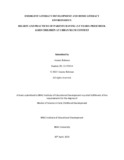Emergent literacy development and home literacy environment: beliefs and practices of parents having (3-5 years) preschool aged children at urban slum context
Abstract
The home literacy environment and experiences of preschoolers typically provide the settings for the development of emergent literacy skills that are important for school readiness and later literacy success. Due to variations in home literacy environment, children enter school with different levels of preparedness to benefit from the experiences at school. Despite that parents being the first educator can provide a supportive and enjoyable home literacy environment, understanding of literacy related concepts and activities among parents specifically from low-socio-economic status remain to be clarified. This study aimed to investigate beliefs, tools and practices of parents of 3-5 years children at urban slum settings regarding the development of emergent literacy competence. A total of six parents, specifically mothers of girls, from three slum areas of Dhaka urban took part in in-depth interviews. Additionally, these six households were also observed. The results are discussed in the light of the views of Piaget, Marie Clay, Vygotsky, and Bronfenbrenner. The results show that almost in all instances, parents’ emergent literacy beliefs are positively related to the home literacy environment. The results will be used to ensure literacy success for all children of Dhaka urban slums with the long-term goal of achieving gender equality in education

